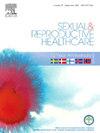芬兰一家三级妇产医院纯母乳喂养与护理质量和产妇因素之间的关系:一项横断面研究
IF 1.7
3区 医学
Q3 PUBLIC, ENVIRONMENTAL & OCCUPATIONAL HEALTH
引用次数: 0
摘要
母亲对高质量医院护理的看法可能会改善母乳喂养的结果,但母亲对医院产后护理的评价往往很差,这突出表明需要关注护理的质量和母亲对护理的看法,而不仅仅是提供护理。纯母乳喂养的妇女比打算的少。目的是根据产妇报告检查纯母乳喂养、护理质量和产妇因素之间的关系。方法于2022-2023年在芬兰一家妇产医院进行横断面研究。数据是通过对分娩后12周内的母亲进行在线调查收集的。护理质量通过分娩满意度、早期母乳喂养开始、以家庭为中心的护理、产妇对产后护理的满意度和母乳喂养支持来衡量。二元逻辑回归分析了纯母乳喂养、护理质量和母亲因素之间的关系。总共有160名母亲参与了研究。缺乏早期母乳喂养(OR 2.20, p = 0.05),母乳喂养支持不足(OR 2.05, p = 0.05),以家庭为中心的护理质量较低(OR 2.14, p = 0.04),初产(OR 2.94, p <;0.001),产前非纯母乳喂养计划(OR 6.44, p <;0.0001),父母自我效能感较低(OR 4.98, p <;0.0001)与非纯母乳喂养有关。非纯母乳喂养最显著的预测因子是缺乏产前母乳喂养计划(OR 6.22)和较低的父母自我效能感(OR 4.81)。结论:早期母乳喂养、支持和以家庭为中心的护理最初与母乳喂养结局相关;然而,只有母亲因素——缺乏产前母乳喂养计划和较低的父母自我效能感——仍然与非纯母乳喂养显著相关。本文章由计算机程序翻译,如有差异,请以英文原文为准。
The association between exclusive breastfeeding and quality of care and maternal factors in a tertiary maternity hospital in Finland: A cross-sectional study
Background
Mothers’ perceptions of high-quality hospital care may improve breastfeeding outcomes, yet postnatal care in hospitals is often rated poorly by mothers, highlighting the need to focus on the quality and maternal perceptions of care, not just its provision. Fewer women exclusively breastfeed than intend to. The aim was to examine the association between exclusive breastfeeding, quality of care, and maternal factors based on maternal reports.
Methods
A cross-sectional study was conducted at a Finnish maternity hospital in 2022–2023. Data were collected through an online survey of mothers within 12 weeks of childbirth. Quality of care was measured by childbirth satisfaction, early breastfeeding initiation, family-centered care, maternal satisfaction with postnatal care, and breastfeeding support. Binary logistic regression analyzed associations between exclusive breastfeeding, quality of care, and maternal factors.
Findings
A total of n = 160 mothers participated. Lack of early breastfeeding initiation (OR 2.20, p = 0.05), inadequate breastfeeding support (OR 2.05, p = 0.05), lower family-centered care quality (OR 2.14, p = 0.04), primiparity (OR 2.94, p < 0.001), antenatal non-exclusive breastfeeding plan (OR 6.44, p < 0.0001), and lower parenting self-efficacy (OR 4.98, p < 0.0001) were associated with non-exclusive breastfeeding. The most significant predictor of non-exclusive breastfeeding was a lack of antenatal breastfeeding plan (OR 6.22) combined with lower parenting self-efficacy (OR 4.81).
Conclusion
Early breastfeeding initiation, support, and family-centered care were initially associated with breastfeeding outcomes; however, only the maternal factors—absence of antenatal breastfeeding plans and lower parenting self-efficacy—remained significantly associated with non-exclusive breastfeeding.
求助全文
通过发布文献求助,成功后即可免费获取论文全文。
去求助
来源期刊

Sexual & Reproductive Healthcare
PUBLIC, ENVIRONMENTAL & OCCUPATIONAL HEALTH-
CiteScore
2.70
自引率
5.60%
发文量
73
审稿时长
45 days
 求助内容:
求助内容: 应助结果提醒方式:
应助结果提醒方式:


